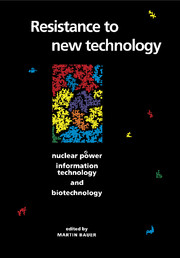Book contents
- Frontmatter
- Contents
- Contributors
- Preface
- 1 Resistance to new technology and its effects on nuclear power, information technology and biotechnology
- PART I Conceptual issues
- 2 The crisis of ‘Progress’
- 3 Reinterpreting ‘Luddism’: resistance to new technology in the British Industrial Revolution
- 4 The changeability of public opinions about new technology: assimilation effects in attitude surveys
- 5 ‘Technophobia’: a misleading conception of resistance to new technology
- PART II Case studies
- PART III International comparisons
- PART IV Comparisons of different technologies
- PART V Afterword
- Index
2 - The crisis of ‘Progress’
Published online by Cambridge University Press: 06 July 2010
- Frontmatter
- Contents
- Contributors
- Preface
- 1 Resistance to new technology and its effects on nuclear power, information technology and biotechnology
- PART I Conceptual issues
- 2 The crisis of ‘Progress’
- 3 Reinterpreting ‘Luddism’: resistance to new technology in the British Industrial Revolution
- 4 The changeability of public opinions about new technology: assimilation effects in attitude surveys
- 5 ‘Technophobia’: a misleading conception of resistance to new technology
- PART II Case studies
- PART III International comparisons
- PART IV Comparisons of different technologies
- PART V Afterword
- Index
Summary
It would be misleading to speak of an anti-scientific mood in public opinion today. Most people support advanced technology or scientific medicine, but it is true that criticism of economic modernization or hospital life is growing. Science is not widely criticized, but the idea of a scientific society is often rejected by science-educated people. We still believe in science, but no longer in progress. I would like to make some comments on this general statement.
Progress means that scientific and technological achievements trigger welfare, freedom and happiness. Condorcet, at the end of the eighteenth century, during the most violent period of the French Revolution and a few weeks before he died, wrote a most enthusiastic hymn to progress, announcing a future of abundance, emancipation and peace. The idea of eternal peace was central to eighteenth-century British, French and German political thought.
Social analysis, from the beginning of the nineteenth century to recent years, has been dominated by the opposition between modernity and tradition, categories which were practically synonymous with good and evil. Modernity was defined as rationalization, both in economic and administrative fields, and as secularization or disenchantment, to use Max Weber's terms, as far as culture was concerned. It was a global view of collective as well as individual life. Modernity was identified with the creative use of reason in all fields, and conceived as domination and mastery of nature, to use Descartes' and Bacon's ideas; also as an instrument of liberation from customs, privileges and prejudices.
- Type
- Chapter
- Information
- Resistance to New TechnologyNuclear Power, Information Technology and Biotechnology, pp. 45 - 56Publisher: Cambridge University PressPrint publication year: 1995
- 5
- Cited by



